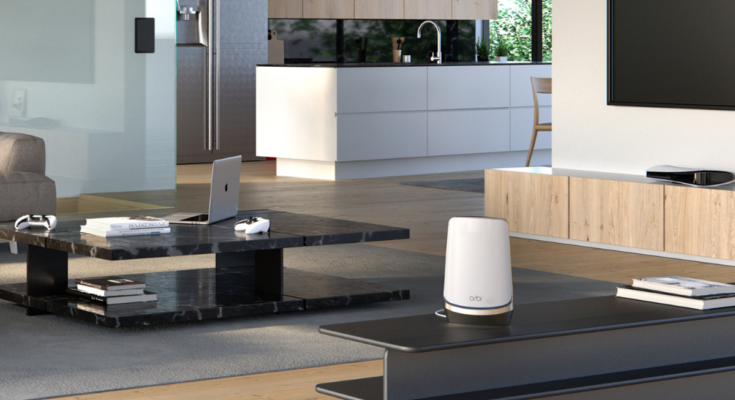
Mesh wifi routers have become a bonafide necessity for connecting numerous devices to the internet, especially as many of us still work from home. And while Netgear’s Orbi is considered a router brand worth springing for, its newest product is a case of putting the cart before the horse.
Netgear just announced its first quad-band WiFi 6E-compatible mesh router, the Orbi Quad-band Mesh WiFi 6E System AXE11000, or RBKE960 Series. The model number is a mouthful, but it’s important to note because it’s how Netgear classifies which bands are inside each Orbi router unit. The quad-band mesh wifi system is billed as a next-generation fix for your cramped home network.
The inclusion of WiFi 6E is obvious because it’s the next generation of wifi. But it won’t immediately benefit you, because there aren’t that many devices that take advantage of the standard yet. Netgear lists a few compatible devices in its press release, including Samsung Galaxy S21, Galaxy Z Fold 3, Dell Latitude 5520, and Lenovo Thinkpad.
The Orbi quad-band router claims it offers more than double the bandwidth, helped in part by its 6GHz band. It has a 10 Gbps WAN port on the primary node and three gigabit ethernet ports on each unit. There’s also a 2.5 Gbps LAN port on each satellite unit for speedy throughput on the backhaul. One Orbi unit can cover up to 3,000 square feet of space, while three Orbi units can handle up to 9,000 square feet of coverage, which is a broader range than its previous limit of 7,500 square feet. You can also use the Orbi app to create four distinct wifi networks for each band, include one specifically for handling 6GHz devices.
The quad-band Orbi also lets you set up a separate smart home network, though it’s unclear what that means or how it will operate. But it sounds like it’ll be easier to manage smart home devices on a different network than your smartphone or tablet.
G/O Media may get a commission
Most high-performance routers are tri-band, which means they have one dedicated 2.4 GHz band and two 5 GHz bands for handling traffic throughput. Tri-band routers typically use that second 5 GHz band as backhaul for passing data back and forth between devices without interrupting bandwidth—kind of like taking the side road home that runs alongside the freeway. The WiFi 6E mesh routers currently on the market swap out the secondary 5GHz for a 6GHz band, so you lose out on that extra bit of runway in exchange for 6GHz’s spacious bandwidth allowance.
With four distinct bands, the Orbi router runs a 6GHz band alongside 5GHz and 2.4GHz bands. It’s good news if you can take advantage of 6GHz, not to mention it will allow you to log on with more devices than ever before. However, a secondary 5GHz band still operates as a backhaul band at WiFi 6 speeds, and that’s because it has a longer-range frequency than 6GHz.
If you’re buying a mesh router right now, you’re better off getting any of the existing WiFi 6 models to help with your internet traffic at home. Unless you have an impossibly tricked-out connected house, even Netgear’s last model of the Orbi is more affordable than this one. Orbi routers already have some of the highest price tags in the market, and this quad-band router is no different. A three-pack of the quad-band Orbi starts at $1,500, and you can add an individual satellite node for a whopping $600.
While there are traffic benefits to having dedicated 6E spectrum on your home network, including less overall congestion, the newest Orbi’s price tag is too much to pay for future-proofing for devices you don’t own yet.



